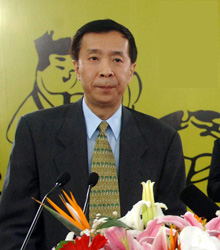| PSBC President Investigated
 |
|
(CFP) |
The Postal Savings Bank of China (PSBC) issued an announcement on June 11, saying that its president Tao Liming is under investigation because of suspicions of "personal economic problems."
PSBC became a joint stock company earlier this year. It has more than 500 million clients, and its assets exceed 4 trillion yuan ($634.92 billion). It is a commercial bank with the largest number of =branches and the largest network in China. At the same time, it has the fifth biggest pool of deposits among China's commercial banks and its asset scale increases fastest among Chinese large national banks.
Tao has been the president of PSBC since March 20, 2007. His economic problems are said to be related to "illegal loans."
Inflation Falls
China's inflation eased to a 23-month low, providing ample room for the government to boost economy.
The consumer price index (CPI), a main gauge of inflation, slowed to 3 percent in May from a year ago, said the National Bureau of Statistics (NBS) on June 9. It weakened from 3.4 percent in April and 3.6 percent in March.
Compared with the previous month, the CPI edged down 0.3 percent, which was mainly attributable to food price decreases.
Food prices, which account for nearly one third of the weighting in the calculation of China's CPI, saw a 6.4-percent year-on-year increase in May.
The producer price index (PPI), a gauge of inflation at the wholesale level, fell 1.4 percent in May from a year earlier.
Liu Yuanchun, Vice Dean of the School of Economics at Renmin University of China, attributed the lower-than-expected CPI growth to the waning effects of imported inflation and lackluster domestic demand.
Moreover, he expected the economy to rebound after hitting the lowest point in the year in the second quarter. Domestic demand will then pick up, which could stop consumer prices from falling, but declining global commodity prices will continue to weigh on domestic prices, he said.
Trade Rebounds
China's foreign trade growth trumped market forecasts to post double-digit rates in May, boosted by slightly improved external markets and more working days in the month.
Exports and imports totaled $343.58 billion in May, up 14.1 percent year on year, rebounding from the 2.7-percent growth in April, said the General Administration of Customs on June 10.
The figure replaced the monthly trade record set in November 2011, when foreign trade amounted to $334.11 billion.
Both imports and exports reached record highs in May, with exports climbing 15.3 percent from a year earlier to $181.14 billion, and imports rising 12.7 percent to $162.44 billion. Trade surplus hit $18.7 billion in May, slightly higher than the $18.42 billion in April.
Improved markets in the United States and Japan, stable growth in emerging economies, as well as less pressure for the yuan to rise further helped boost May's trade data, said Huo Jianguo, Director of the Chinese Academy of International Trade and Economic Cooperation.
But the country should still be cautious about the long-term trend, Huo said, citing uncertainties with the euro-zone debt crisis.
Lowered GDP Forecast
China's economic growth will likely moderate to around 8 percent this year amid downward risks caused by the ongoing crisis in Europe, said an official from the International Monetary Fund (IMF) on June 8.
In April, the IMF predicted an annual growth of 8.2 percent for China. David Lipton, First Deputy Managing Director of the IMF, told Xinhua News Agency that the latest revision is still a comfortable growth for China under the current circumstances.
Though it's hard to tell the impact that the European crisis will have on other countries, it's important that China and other countries be ready and attentive to the possible outcomes, said Lipton.
China has the space for a forceful response if the world economy further slows and then affects the Chinese economy, stressing that the stimulus measures, if necessary, should align with the goal of quality growth that relies less on investment, more on consumption, and is environmentally friendly, he said.
Boosting Logistics
The National Development and Reform Commission (NDRC) on June 8 published a guideline on offering more support to private investors in the logistics sector.
To ensure fair competition, the guideline pledged a substantial tax reduction for private logistics companies, a more favorable land-use policy and a better financing environment.
The newly adopted guideline specified a list of key logistic areas in which private investors should be encouraged to enter, including medicine and renewable resources delivery, supply chain management and cooperation with state-owned railway logistic companies.
It also welcomed private companies to invest in infrastructures for the logistic industry.
Aircraft Sales
Xi'an Aircraft International Corp. (XAIC) will sell three MA60 regional aircraft to MARS, a Ukrainian-based airline, marking the first time for China-made civil regional aircraft to enter the European market.
The press release issued by the XAIC in June did not disclose the contractual price or the delivery date.
The deal marks a breakthrough in China-Europe cooperation in aviation, said Jiang Jianjun, General Manager of XAIC.
Jiang said the twin-turboprop MA60 aircraft produced by the XAIC have become popular in domestic and overseas aviation markets due to the aircraft's fuel efficiency.
"Because of rising fuel prices, the fuel-efficient turboprop is expected to have bright market potential," said Jiang. | 